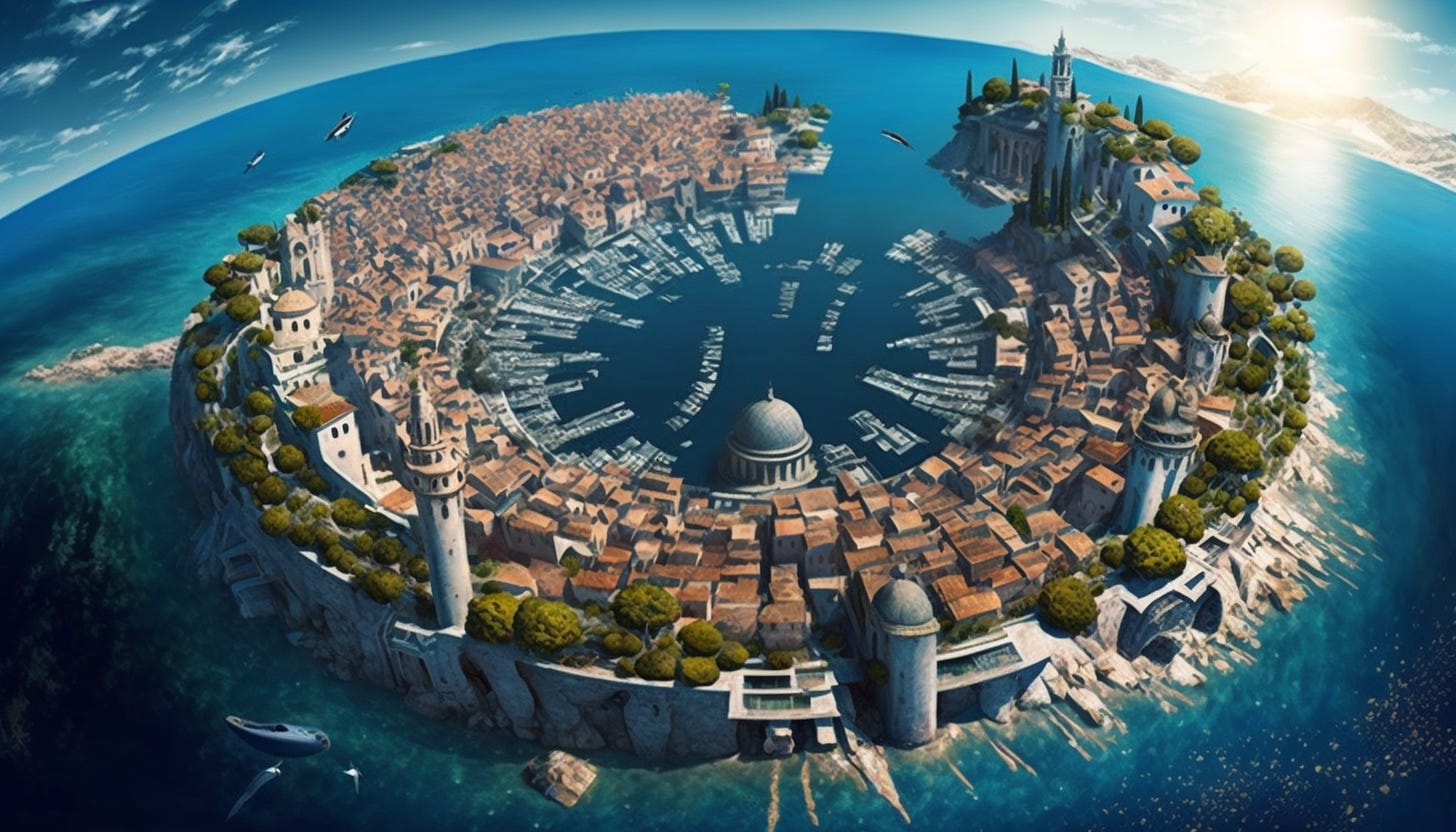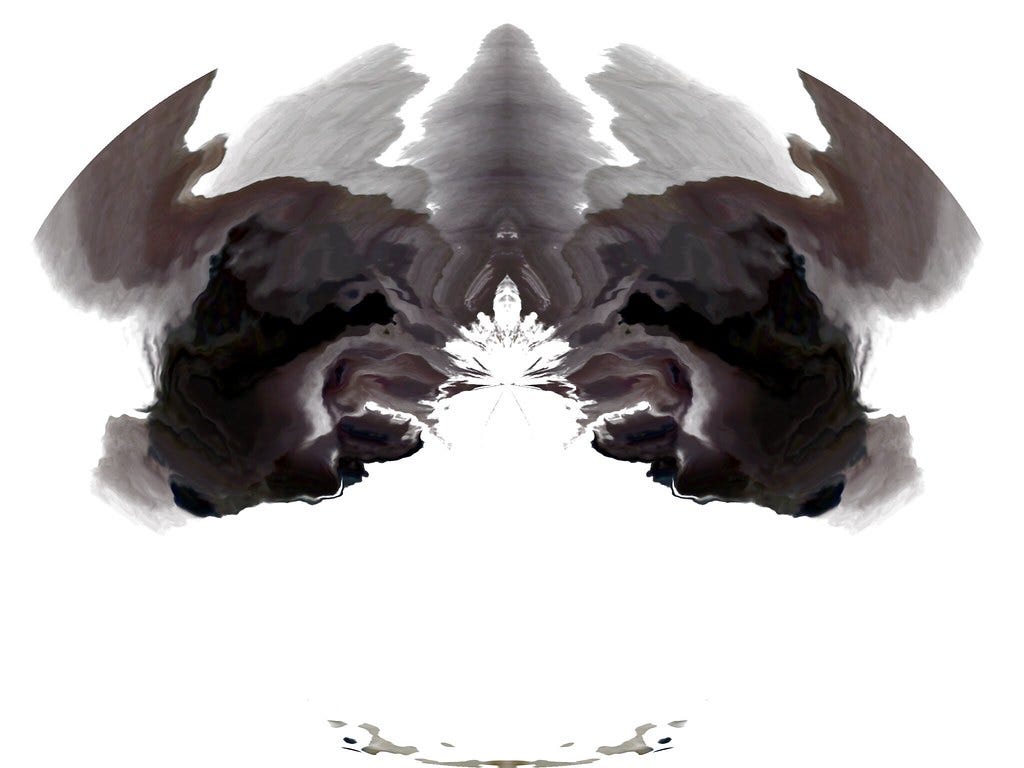
Dear Classical Wisdom Readers,
One of the most famous myths from the ancient world, the story of Atlantis has captured the imagination for literally thousands of years… and yet, its meaning, its veracity and its historical context are still up for discussion.
So, we’re going to do just that.
Next week, on August 9th at Noon EST, we’ll be holding our Members Roundtable Discussion on the topic… and to get you enthusiastically prepared, Benjamin B. Olshin (who will be leading the conversation), has helpfully provided some notes, as well as two originals texts to read.
Enjoy this excellent introduction to a topic that continues to enthrall… below.
All the best,
Anya Leonard
Founder and Director
Classical Wisdom and Classical Wisdom Kids
The Story of Atlantis in Plato: Some Notes
Benjamin B. Olshin1
A Question of Identity
The land of Atlantis is not lost; it is simply missing. The land may or may not have existed in reality, but it exists in text, and so perhaps it has not been sought in the proper way. Atlantis certainly is there, at least in Plato’s narrative, and a careful look at his words may help in understanding the nature of this strange land, and the "Atlantean idea".
We also should look at Plato’s tale not as modern readers might wish to do — hoping to find a simple piece of engaging piece of fiction — but rather open to encountering a perhaps purposefully opaque and ambiguous narrative.
Of course, few subjects have generated as much idle and ill-informed historical musing and fantastic archaeological speculation as Plato’s tale. The literature concerning the story is massive, with commentators placing Plato’s mysterious continent everywhere from Antarctica to the Mediterranean.
Modern speculations concerning Atlantis began with Ignatius Donnelly’s 1882 book entitled Atlantis: The Antediluvian World, which has seen numerous reprints following its nineteenth-century debut. Bizarre musing by the Theosophists followed, with W. Scott-Eliot’s 1925 book, The Story of Atlantis and the Lost Continent of Lemuria. Since then, dozens of books have appeared on the subject.
In both popular and academic literature, many authors have used Plato’s text primarily as a launching point for speculative — and actual — archaeological investigations in various locales around the world, from Bimini to Bolivia to Antarctica. Even more serious studies of Plato’s text also have led to a similar obsession to “place” Plato’s account somewhere in actual geographical terms. Yet these analyses have usually led to reading into the text what simply is not there.
As one author has put it, “Plato’s story of Atlantis takes on the characteristics of a Rorschach test, with readers encountering whatever they were hoping to find.”
Rather sober investigation by classicists and archaeologists has focused on the Mediterranean, with a number of scholars arguing that in his Atlantis narrative, Plato was referring to Minoan Crete. The island of Thera (Santorini), some 120 kilometers from Crete, suffered a volcanic eruption in the fifteenth century B.C.E., and this has led to a conjecture that the decline of Minoan culture was a direct result. Further, it is argued, Plato had this information somehow, and went on to “mythologize” it in the form of the Atlantis account.
Another argument is that Plato was referring to an area of what is now modern Turkey, while a study by a geophysicist posits the idea that Plato and even earlier authors were discussing an area in what is today Andalusia.
But all of these interpretations are speculative readings of the text, and in making speculations, what the text actually says is — if not ignored — often gently set aside. This is unfair to the account we find in Plato, which is, in short, the origin of all other ruminations on Atlantis. As one commentator says2, the:
Thera proponents must face a battery of discrepancies between the Platonic account and the allegedly ‘real events” at Thera: Plato’s island was of huge dimensions... outside the Pillars of Heracles in the Atlantic Ocean; it and its city were fully ten times larger than any possible dimension at either Knossos or Thera... [and in Plato’s account] the Atlantic isle was totally submerged forever, whereas Thera, or at least half of it, and all of Crete, remain.
Only a few scholars — such as Diskin Clay, Christopher Gill, and Harold Tarrant — have tackled Plato’s account directly, and they have provided excellent insights into the context and content of the text itself.
But the question remains: How should we understand Plato's peculiar story?
Classical Wisdom Members, please continue for a review of the texts as well as the important extracts from both Plato’s Timaeus and Plato’s Critias, below.
Also make sure you have registered for this event in advance. Once you have signed up, you will receive the Zoom link to join on August 9th at NOON EST. You can also do so at the end of this email.
Not a member? Make sure to subscribe to join this in depth Roundtable discussion on the Mystery of Atlantis.
Headed by Benjamin B. Olshin, former Professor of Philosophy, the History and Philosophy of Science and Technology, and Design at the University of the Arts in Philadelphia, we’ll ask: what did this myth mean in the ancient world versus now? How important is the context to understanding this myth? Could it be true…and is that the correct question?
Más info en frasco@menadelpsicologia.com / Tfno. & WA 607725547 Centro MENADEL (Frasco Martín) Psicología Clínica y Tradicional en Mijas Pueblo #Psicologia #MenadelPsicologia #Clinica #Tradicional #MijasPueblo
*No suscribimos necesariamente las opiniones o artículos aquí compartidos. No todo es lo que parece.


No hay comentarios:
Publicar un comentario